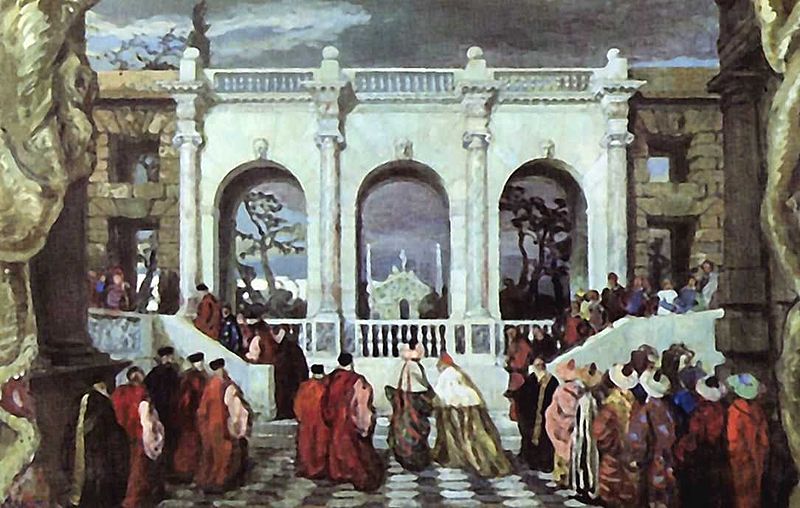August 19, 2013.Claude Debussy.The great French composer was born on August 22, 1862 in Saint-Germain-en-Laye, not far from Paris.We’ve written about Debussy a number of times in the past (for example here), so to commemorate his birthday this time, we’ll focus on his last symphonic composition, a “dance poem” Jeux (Games).Jeux was composed in 1912 for Sergei Diaghilev’s Ballets Russes.The timing of this post is auspicious because right now the National Gallery of Art’s is running an exciting exhibition, “Diaghilev and the Ballets Russes, 1909 – 1929.”It is aptly subtitled “When Art Danced with Music.”
Jeux was not the first Ballets Russes production to use Debussy’s music: earlier in the year, Nihjinsky choreographed and performed in the ballet L'après-midi d'un faune, which was based on a symphonic poem by Debussy called Prélude à l'après-midi d'un faune (Prelude to the Afternoon of a Faun).L'après-midi, written in 1894, was based on a poem by Stéphane Mallarmé.Jeux, on the other hand, was written specifically as a ballet and was choreographed by Vaclav Nijinsky (he and the famous Karsavina danced in the original production).The first libretto called for an erotic encounter between three men.This turned out to be too scandalous even for the scandal-seeking Diagilev, so two of the men were turned into girls, without lessening the erotic charge.For the sets, Diagilev originally approached the painter Alexandre Benois; Benois’s idea was to create a 16th century Venetian holiday.This project fell through and production went to Leon Bakst, who previously created ingenious set designs for L'Après-midi d'un faune, Daphnis et Chloé and several other productions.In Bakst’s sets Jeux turned into a fantasy about the game of tennis and a love triangle.The ballet premiered at the Théâtre des Champs Elysées on May 29, 1913 with Pierre Monteux at the podium.The reception was lukewarm at best.And then, just two weeks later, Ballets Russes staged Stravinsky’s Le Sacre du printemps.The enormous scandal that engulfed that production completely eclipsed Jeux.Even though Jeux continued to be staged sporadically (Pierre Bonnard created some very interesting sets in 1920 for the L'Opera Garnier production), Debussy’s music was labeled unsuccessful and in the subsequent years was half-forgotten; its first commercial recording was made only in 1947.It took the likes of Pierre Boulez to gauge the real importance of the music.The harmonies of Jeux are indeed unusual, even for the contemporary ear.The melodies and tempos flow freely and change very frequently, sometimes as often as every two bars.The poem’s tonal base is also elusive.Pierre Boulez, in his analysis of Jeux, pointed to parallels with Anton Webern’s serialism.
We’ll hearJeux performed live by the Royal Concertgebouw Orchestra, Christian Thielemann conducting.The picture above is from the unrealized staging of the ballet by Alexandre Benois.
Claude Debussy 2013
August 19, 2013. Claude Debussy. The great French composer was born on August 22, 1862 in Saint-Germain-en-Laye, not far from Paris. We’ve written about Debussy a number of times in the past (for example here), so to commemorate his birthday this time, we’ll focus on his last symphonic composition, a “dance poem” Jeux (Games). Jeux was composed in 1912 for Sergei Diaghilev’s Ballets Russes. The timing of this post is auspicious because right now the National Gallery of Art’s is running an exciting exhibition, “Diaghilev and the Ballets Russes, 1909 – 1929.” It is aptly subtitled “When Art Danced with Music.”
last symphonic composition, a “dance poem” Jeux (Games). Jeux was composed in 1912 for Sergei Diaghilev’s Ballets Russes. The timing of this post is auspicious because right now the National Gallery of Art’s is running an exciting exhibition, “Diaghilev and the Ballets Russes, 1909 – 1929.” It is aptly subtitled “When Art Danced with Music.”
Jeux was not the first Ballets Russes production to use Debussy’s music: earlier in the year, Nihjinsky choreographed and performed in the ballet L'après-midi d'un faune, which was based on a symphonic poem by Debussy called Prélude à l'après-midi d'un faune (Prelude to the Afternoon of a Faun). L'après-midi, written in 1894, was based on a poem by Stéphane Mallarmé. Jeux, on the other hand, was written specifically as a ballet and was choreographed by Vaclav Nijinsky (he and the famous Karsavina danced in the original production). The first libretto called for an erotic encounter between three men. This turned out to be too scandalous even for the scandal-seeking Diagilev, so two of the men were turned into girls, without lessening the erotic charge. For the sets, Diagilev originally approached the painter Alexandre Benois; Benois’s idea was to create a 16th century Venetian holiday. This project fell through and production went to Leon Bakst, who previously created ingenious set designs for L'Après-midi d'un faune, Daphnis et Chloé and several other productions. In Bakst’s sets Jeux turned into a fantasy about the game of tennis and a love triangle. The ballet premiered at the Théâtre des Champs Elysées on May 29, 1913 with Pierre Monteux at the podium. The reception was lukewarm at best. And then, just two weeks later, Ballets Russes staged Stravinsky’s Le Sacre du printemps. The enormous scandal that engulfed that production completely eclipsed Jeux. Even though Jeux continued to be staged sporadically (Pierre Bonnard created some very interesting sets in 1920 for the L'Opera Garnier production), Debussy’s music was labeled unsuccessful and in the subsequent years was half-forgotten; its first commercial recording was made only in 1947. It took the likes of Pierre Boulez to gauge the real importance of the music. The harmonies of Jeux are indeed unusual, even for the contemporary ear. The melodies and tempos flow freely and change very frequently, sometimes as often as every two bars. The poem’s tonal base is also elusive. Pierre Boulez, in his analysis of Jeux, pointed to parallels with Anton Webern’s serialism.
We’ll hear Jeux performed live by the Royal Concertgebouw Orchestra, Christian Thielemann conducting. The picture above is from the unrealized staging of the ballet by Alexandre Benois.